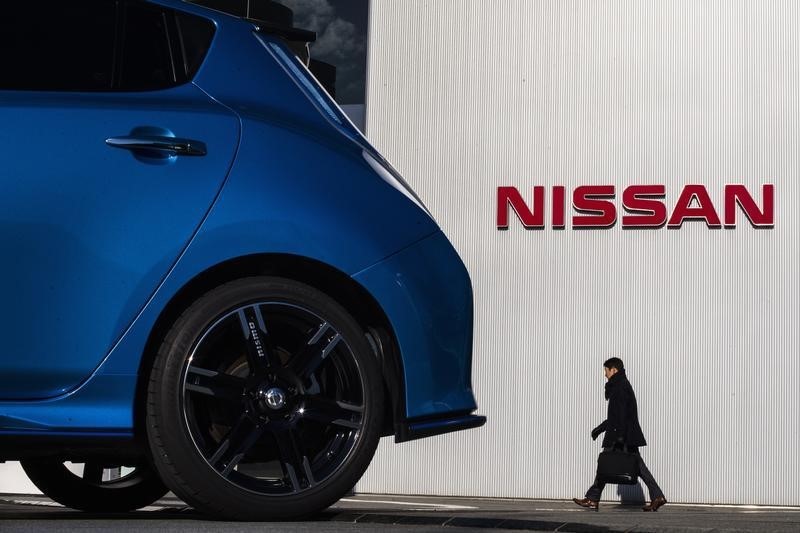This post was originally published on this site
https://i-invdn-com.investing.com/trkd-images/LYNXMPEJ5R0HH_L.jpg
(Reuters) – Nissan (OTC:NSANY) installed a camera surveillance system at the home of former executive Ashwani Gupta so the automaker’s internal security team could monitor him, according to the preliminary findings of an investigation into the surveillance, two people with knowledge of the report said.
Nissan has been investigating a claim that Chief Executive Makoto Uchida carried out surveillance of the carmaker’s second- in-command to acquire leverage to remove him from the company because of Gupta’s opposition to some terms in a new partnership deal with Renault (EPA:RENA), Reuters reported on Saturday.
Nissan directors were briefed on the preliminary findings of the investigation into the surveillance claim by U.S. law firm Davis Polk & Wardwell at a board meeting on June 20 at the company’s Yokohama headquarters, the two people said.
The preliminary report said Nissan had installed two sets of security cameras at the entrance to Gupta’s house in Tokyo’s Shibuya ward, the people said.
It said the first system was for use by a private security firm while the second system was set up for access by Nissan’s internal security team to monitor Gupta, the two people said.
The report from the U.S. law firm did not offer a finding on whether the use of cameras by Nissan to monitor Gupta was illegal, nor did it detail whether Gupta was made aware of the monitoring, the two people said.
Reuters was unable to determine when the cameras were installed or the name of the private security company.
Uchida and Gupta, who was still a Nissan director and chief operating officer on June 20, were recused from the board meeting. A final report on the investigation, which started in late May at the request of Nissan’s independent directors, was expected as soon as July, the two people said.
Nissan said it could not comment on ongoing investigations and declined to make the executives available for comment.
Davis Polk did not respond to a request for comment.
SURPRISE DEPARTURE
Under Japanese law, a company can monitor communications on corporate phones and computers and investigate an employee’s conduct outside work in protecting its business interests, said Akira Takeuchi, a lawyer and certified fraud examiner in Tokyo, emphasising he was speaking in general and not about Nissan.
The preliminary findings presented to the board did not offer a conclusion on the claim by senior adviser Hari Nada in a letter to Nissan’s independent directors that Uchida had played a role in the surveillance, the two people said.
Nissan announced earlier this month that Gupta, 52, would leave the company on June 27, the day of the automaker’s annual shareholder meeting, to pursue other opportunities.
Nissan had said in May that Gupta, who had been chief operating officer since 2019 and was widely seen as a possible successor to Uchida, would not be reappointed to the board.
In his April letter, Nada said Nissan reviewed allegations about Gupta’s conduct in the week of April 10 and that he had been asked to resign. Three people with direct knowledge of the matter said this related to an allegation of harassment against Gupta from a female employee.
In his letter, Nada asked for an international law firm to be brought in to investigate the surveillance of Gupta. He also said the law firm should look into the circumstances around the investigation into Gupta’s conduct, whether the result was predetermined and the involvement of Uchida.
In its report presented to the board, Davis Polk told Nissan directors that it appeared the company’s audit committee had used its investigative authority in an arbitrary way in taking up the complaint against Gupta in the way that it did, the sources said.
NEW BOARD
In another report about the allegations about Gupta’s conduct presented to the board, Japanese law firm Iwata Godo offered a view on the narrower question of whether the audit committee’s actions were lawful, one the people said.
Iwata Godo said there was no evidence the committee or its head, Motoo Nagai, had acted illegally in their handling of the complaint against Gupta, the person said.
Nagai was also recused from the meeting last week at which the surveillance and harassment allegations were discussed. Nissan declined to make him available for comment.
Iwata Godo did not respond to a request for comment.
Reuters was unable to determine if either law firm had made any finding about the harassment claim itself, beyond how it was handled. Nada said in his letter he understood that Japanese law firm Anderson Mori & Tomotsune had investigated the claim.
Anderson Mori & Tomotsune has declined to comment.
In February, Nissan and Renault announced the terms of a new partnership under which the Japanese automaker would buy up to 15% of an electric vehicle unit Renault is spinning off while the French carmaker would reduce its 43% stake in Nissan.
Senior Renault executives had viewed Gupta as slowing down or blocking the completion of the new alliance deal, a person with knowledge of Renault’s position has said.
On Tuesday, Nissan shareholders elected 10 directors, including Uchida, to the board. Gupta attended the meeting on what was his last day with Nissan.
When a shareholder asked Gupta how he viewed his time with Nissan, Uchida answered on his behalf saying the executive had contributed greatly to projects such as the automaker’s strategic plan.

